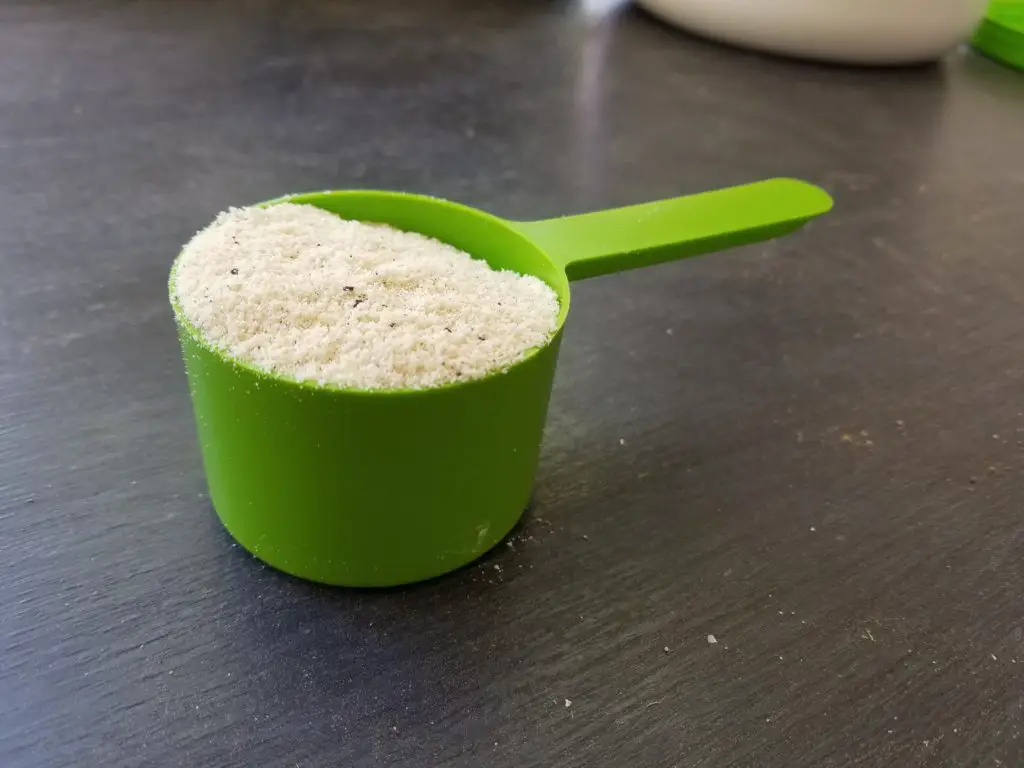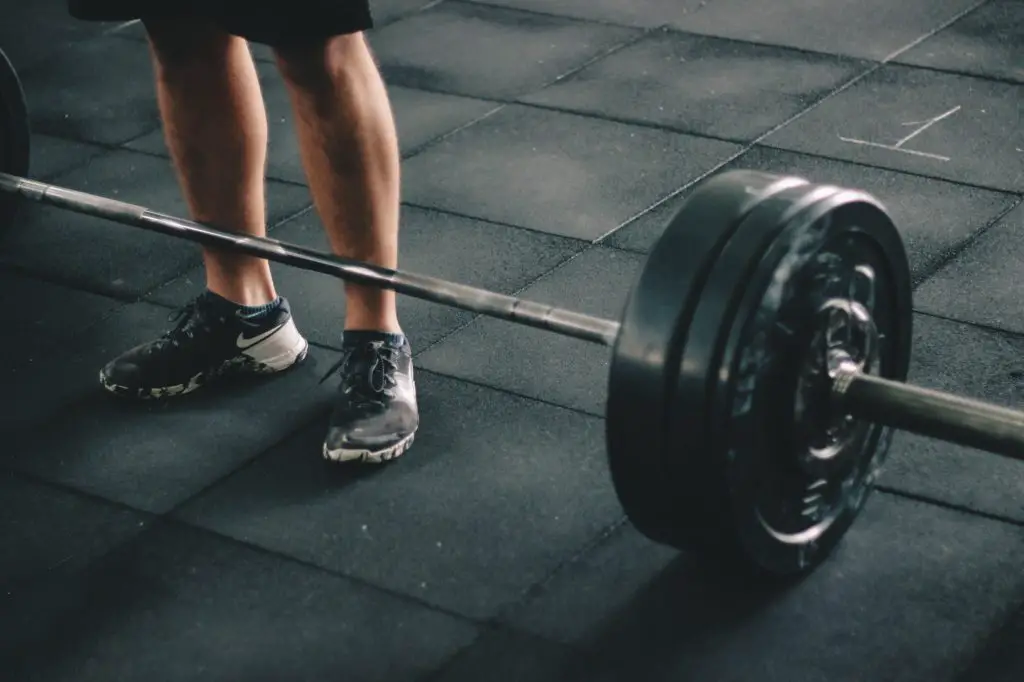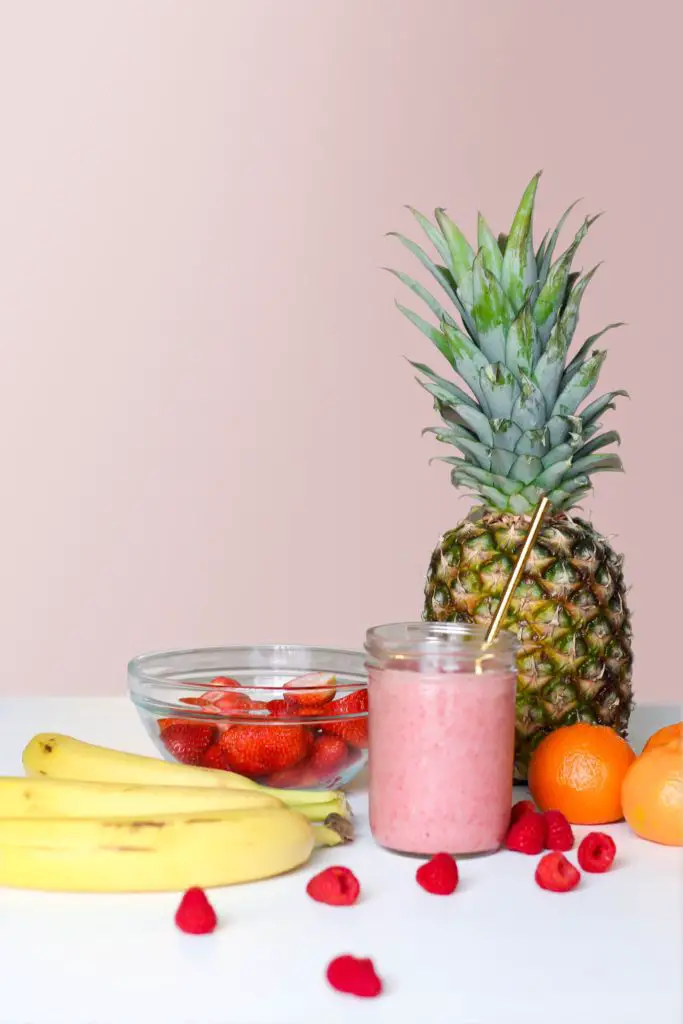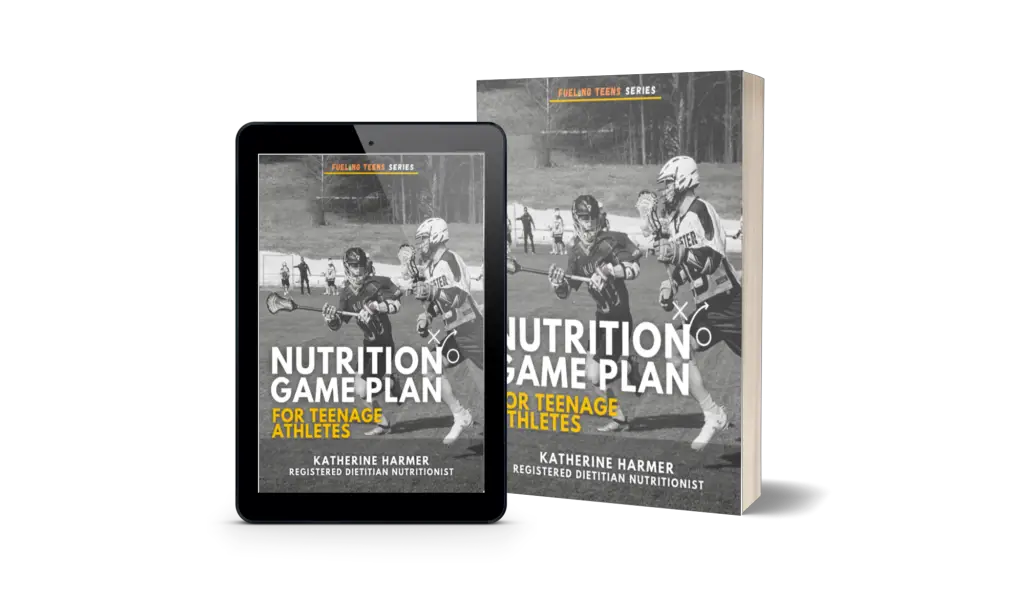Protein is important for athletes and protein supplements are often an easy way for athletes to fit in their post-workout protein to help repair and build muscles.
Some brands of protein powders are acceptable and safe for teenagers, however most teen athletes do not need additional protein and many protein powders are unsafe for teenagers. Teens should avoid most supplements, including protein powders, and get nutrients through whole foods.
Growing teen athletes should focus on getting appropriate nutrition for growth, development, and physical activity.
Whey protein is a popular choice for protein powder because it is easily digested and absorbed for use to build your muscles. Find protein powder tips for teenagers below as well as how much protein a teenage athlete needs and the best protein powders and shakes for teens.

What is Whey Protein?
Whey is a protein found in dairy. It is the watery part of milk which is removed during the cheese-making process.
Whey liquid goes through a few more processing steps until it is a powder that is added to meal replacement shakes, protein bars, and more. It’s not very tasty by itself so it is usually flavored vanilla, chocolate, even cookies and creme or berry.
Whey protein is a complete protein, which means it contains all the essential amino acids to build proteins in your body. It has little fat, little lactose, and it is digested quickly, although it may cause bloating and an upset stomach in some people.
You may not want to take whey protein if you are lactose-intolerant or sensitive to dairy foods (whey isolate or hydrolysate may work for you, but probably not whey concentrate which contains amounts of lactose).
Whey protein is a popular choice for protein supplements, even in some baby formula. However, whey protein supplements should be used with caution.
Benefits of Whey Protein
- Easily digested.
- Rich in branched- chain amino acids (BCAAs). Leucine, a BCAA, helps promote muscle growth and recovery after exercise.
- May help you feel “full” and reduce appetite, which could help you lose weight.
- Complete Protein- contains all essential amino acids that your body cannot make.
Is Whey Protein Safe For Teenage Athletes?
Teenagers may want to use protein powder to bulk up or become bigger, stronger, and faster on the field. But likely, teens don’t really need it. Consuming extra protein above a teen’s recommended amount won’t be useful, and could possibly even be harmful.
Whey protein is made from milk, so if you choose a supplement, choose one that is just whey protein without other additives. Whey itself is likely fairly safe when purchased in this natural form from a high-quality manufacturer.
The Dangers of Protein Supplements for Teens:
Most protein powders have fine print warnings that say “intended for healthy adults over the age of 18“. This is because supplements are not strictly regulated by the U.S. Food and Drug Administration. Protein supplements are intended for adults over age 18 because their effects are not studied on teenagers and may not be safe for teens.
Since protein powders are not heavily regulated, some have been found to contain prohibited substances or be contaminated with toxic chemicals and harmful ingredients for teenagers and children (heavy metals such as cadmium, mercury, arsenic, lead, or other toxins such as BPA have been found in protein supplements). This is a risk to healthy teens as they are growing and developing and going through puberty.
Additionally, many protein drinks contain not-so-good-for-you fillers and added sugars. With potential unsafe ingredients for teens, protein powders should not be your go-to for increasing protein in a teenager’s diet. I’ll give my favorite tips for getting more protein without protein supplements below.
See also: Meal Plan for Teenage Athletes
Excess Protein:
Teen athletes need more protein than non-active teens. Some teens could benefit from a protein supplement, however there are still some risks, including risks related to excess protein intake.
It is hard to get too much protein from food, but if a teen adds protein powder to their diet they are likely getting too much protein. A diet too high in protein for a teen can cause dangerous side effects such as kidney problems, dehydration, liver problems, and calcium losses (i.e. weak bones).
Eating too much protein also equals excess calories that are usually stored in the form of fat which equals unwanted weight gain. Although protein is an essential nutrient, it’s possible for a teen to consume too much. The body can only use so much protein, so any extra won’t result in more muscle and greater health. Extra calories from protein are stored as fat.
Too much whey protein can also have unwanted side effects such as nausea, flatulence, diarrhea, pain and cramping.
The healthiest and best way for teenage athletes to get extra protein is through food. Teens can get enough protein through their diet, even if they are trying to put on muscle. Eating enough servings of lean meats, fish, dairy, eggs, nuts, and seeds will help teenagers get plenty of protein without going over-board. Most teens get plenty of protein in their diet through regular foods.
Even so, there may be a place for protein powder in your teenage athlete’s diet. If busy kids aren’t hitting their daily protein target it can be harmful for overall growth and development.
Young vegetarians, high-carb eaters, and some underweight kids may not be getting enough protein. In these cases, a safe protein powder for teenagers could be recommended with a doctor’s approval.
This would only apply to a small number of teenagers, please ask your doctor before using any supplements. It is also a good idea to consult with a Registered Dietitian Nutritionist to determine protein intake goals for your teenager.
My advice (a registered dietitian nutritionist): protein powders are not necessary for most teen athletes. A well-balanced protein-rich diet will benefit you a lot more than protein powder ever will. Stick to whole foods in order to get enough protein in your diet. If you do need a little extra protein, use small amounts of protein powder. Look for a protein powder without artificial sweetener and flavors.

Why Athletes Need Protein
Protein intake is important for everyone, but especially for athletes. Your body needs enough protein spaced out regularly through the day to help you build, strengthen, repair, and maintain muscle and other body tissue after a workout.
Protein requirements for athletes are greater than other sedentary individuals. Occasionally a supplement may be required.
How Much Protein Do Teenagers Need?
Non-athlete teenagers need about 0.3 to 0.4 grams of protein per pound of body weight (about 0.85 grams per kilogram). This equals about 40 to 60 grams of protein per day, depending on size. This can easily be met through whole foods.
How Much Protein Do Teen Athletes Need?
Teenagers need a lot of protein due to the years of growth and development, but teenage athletes need even more protein than kids who aren’t physically active. Protein needs depend on age, gender, weight, and activity levels.
Teenage athletes need about 0.45 to 0.6 grams of protein per pound of bodyweight, a slight increase from the recommendations for non-athletes. This is about 50 to 90 grams per day, depending on size.
Teens athletes can meet their protein requirements by including protein foods a few times regularly spaced throughout the day. Many animal and plant sources contain protein, but high-quality protein is from animal products such as meat, poultry, fish, eggs, milk and dairy products, as well as soy products. These are the best protein sources teens can include in their diet.
Studies have found that young athletes eat plenty of protein, even 2 or 3 times more than the recommended amount. Adding even more protein to their diets will not help them build additional muscle.
Supplementing with whey protein is not likely necessary. If teens already eat enough meat, fish, eggs, and dairy products, they probably don’t need extra whey protein supplements.
Is it OK For a Teenager to Drink Protein Shakes?
Protein shakes are pre-mixed protein drinks that are bought ready-to-drink. These usually contain added fillers such as sugars and artificial sweeteners, fat, and other ingredients. I wouldn’t recommend protein shakes to teenagers.
If you really like protein shakes you can make your own! Blend some greek yogurt, chia seeds, and frozen fruits and vegetables to get 20+ grams of protein, an appropriate amount pre- or post-workout. You don’t need to add protein powder for a protein-packed smoothie or shake.
For teenagers looking to build muscle, they might want to include some protein shakes. The best way to build muscle isn’t to load up on protein, but to be smart about when you eat protein. Eating a balanced amount of protein 3-4 or more times per day will help you build muscle.
If your physician recommends protein shakes, stick with an age-appropriate protein powder, and not pre-made shakes. The serving size is typically 1-2 scoops of protein powder per day for anywhere from 20-50 grams of protein. I would recommend only 1/2 scoop per day, but teens can get the protein they need from a healthy diet.
Should 16-year-olds Take Protein Shakes?
Protein shakes are not necessary and could even be unsafe for a 16-year old, even for an athlete. A 16-year old needs around 50 grams of protein per day. Protein needs can be met with food easily. By including a protein food at each meal and snack, you will get plenty of protein to meet your needs.
Here’s a Sample Menu of More Than 50 Grams of Protein in a Day:
- Breakfast- Protein shake made with 1/4 cup Greek yogurt, 1 cup milk, 1 tablespoon chia seeds, 1 frozen banana, 1/4 cup frozen zucchini, and 1 tablespoon natural peanut butter. (20 grams of protein)
- Snack- small handful of trail mix, string cheese (15 grams of protein)
- Lunch- 3 oz tuna sandwich on whole wheat bread, apple, 1/4 cup hummus, carrot sticks, crackers (33 grams of protein)
- Snack- 8 oz Greek yogurt with 1/4 cup granola (18 grams of protein)
- Dinner- 1 cup leafy green salad, 2 bean burritos with salsa (30 grams of protein)
- Grand total for the day = 116 grams of protein in a normal day without even trying. Teens need between 40-90 grams of protein per day, which means most teens are getting plenty of protein.
Best Protein Powders and Protein Shakes for Teens.
Again, whole foods are best and teenage athletes can get plenty of protein from foods. If there is a place for protein supplements in a teenager’s diet they should look for one that doesn’t have added sugars, artificial sweeteners, fillers, supplements, or fats.
My Recommendations for Whey Protein and Vegan Protein for Teenagers:
(be sure check with your doctor before using a protein supplement!)
Naked Whey Grass Fed Unflavored Whey Protein Powder. I like that this brand is organic, has zero additives, and claims zero contamination from heavy metals and other unsafe ingredients. Pure and simple straight whey protein, but unflavored and probably doesn’t taste very good plain. Mix it with your favorite smoothies, oatmeal, or a glass of milk.
Orgain Organic Whey Protein Powder– this is one of the only ones that isn’t sweetened with artificial sweetener. It has some fiber and no added sugar. Orgain claims it is healthy for adults and kids. They also have vegan plant-based protein powder here.
CalNaturale Svelte Organic Protein Drink. This one is not whey. Svelte is dairy-free and plant-based made of soy-milk for anyone that is lactose intolerant or vegan. It has added vitamins and minerals and it is also gluten-free, organic, vegan, low in sugar, and doesn’t use artificial flavorings. You can find it here on Amazon, they are having a sale right now on your first order. You can also get it at your grocery store.
Organic Valley Milk Protein Shake– This protein shake is organic, lactose-free, and contains 26 grams of milk protein. Get it here on Amazon.

Homemade Protein Smoothie – but really the best option for protein intake is a homemade smoothie or shake using whole food ingredients. Experiment with a few options and you’ll find some delicious shakes. You can fit a lot of protein in a homemade smoothie with the right ingredients. Here’s a sample customizable recipe to get you started:
- 1/2 cup Greek yogurt
- 1-2 cups milk
- 1-2 tablespoons chia or flax seeds
- 1 cup frozen fruit such as bananas, berries, peaches, mangoes
- 1 cup vegetables such as spinach, zucchini, kale, celery, beets
- Any other add-ins: oats, nut butter, cocoa powder, vanilla, ice, etc.
Getting protein from whole food is more beneficial than using supplements. A homemade protein shake can provide 20+ grams of protein without using any protein powder. It’s easy to bring a homemade shake to school for breakfast or before practice in a Blender Bottle. You can get a good price for a set from Amazon here. (I love to use mine as a water bottle too!)
Need more help with game nutrition this season? Check out my meal plans:
- Nutrition Game Plan for Teenage Athletes
- Nutrition Game Plan for Teenage Football Players
- Nutrition Game Plan for Teenage Basketball Players
- FREE Downloadable Meal Plan for Teen Soccer Players
My newest ebook will help you with a 28-meal plan, customizable snacks, supplement tips, how to lose or gain weight the right way, meal schedule, etc.

Summary
- Whey protein has many benefits and can help build muscle, however protein supplements aren’t recommended for teenagers.
- Unregulated contaminants and unsafe ingredients for teenagers have been found in protein supplements.
- Protein powders can cause excess protein intake which is harmful.
- The best way to have a high-protein diet is to plan a diet of evenly spaced out high-protein foods such as meats, fish, dairy products, seeds, nuts, and beans throughout the day.
Check Out Some of my Other Posts for Teenage Athletes:
- Best Supplements for Teenage Athletes
- Should Teenagers Take a Multivitamin Supplement?
- Best Meal Plan for Teenage Athletes (FREE Download)
- The Worst Foods to Eat Before Football
- The Best Fruits for Teen Athletes
- How Big Should Football Players Be?
References
Academy of Nutrition and Dietetics. How Teen Athletes Can Build Muscle with Protein. Jill Castle, MS, RDN. Accessed September 24, 2018.
Fueling Teens is a participant in the Amazon Services LLC Associates Program, an affiliate advertising program designed to provide a means for sites to earn advertising fees by advertising and linking to Amazon.com. We also participate in other affiliate programs which compensate us for referring traffic.
